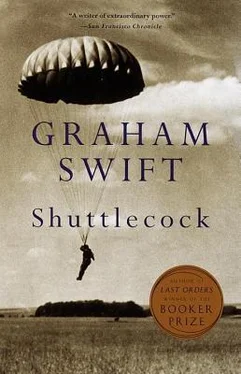I took another step forward. If the sentry should turn round now to throw his match into the passage-way, better he should come face to face with me with my drawn stiletto than catch me at a distance. But he tossed the match casually to his right, scarcely moving his head. As his right hand was engaged, returning the match-box to his pocket, I struck — my left hand covering his mouth, fingers pinching the nose, the blade entering left of the spine: a text-book application of my close combat training. The only thing I had forgotten was the cigarette. My hand rammed most of it into the sentry’s mouth, but I was left with an angry burn in the centre of my palm.…
My Dad. Cold steel. A man’s back.
Marian and the kids are walking through the gardens, opposite the ice rink; round the bend where the river stretches away upstream in a long, straight, tree-fringed view; on, along the towpath by Petersham meadows, where there are always some cows or a pony or two; the boys will walk along the top of the little concrete wall by the towpath, as they always do, and Marian will walk below. Then to the ferry point at River Lane, where the trees begin — the tall chestnuts behind the towpath, in new leaf, and, by the river, alders and willows, dipping and stooping over the water, the wash heaving over the branches, scooting mallards … I can see all this almost more vividly than if I were there myself. And suddenly I clutch Dad’s book closer, protectively, to me, as if Marian, likewise, can see me with it, sitting by the french windows, like a man with a secret no one else must see, with a possession no one else must share.
… Reprisals did take place. We heard that two men from the factory were questioned then arbitrarily shot. But the shipment times were not changed. One shipment — the next scheduled that month — was successfully sabotaged, not by our group but by Lucien’s. Following this, we heard that the factory manager was being ‘investigated’ by the Gestapo.
But it was now time for me to bid adieu to Jules and Émile. My period in the Caen region was coming to an end.…
So Dad slips away (end of Chapter 12), terse and brisk as ever, to his next assignment; to be picked up, in a moonlit field, by an R A F Lysander; to be dropped, four weeks later, into France again. And so he slips away from me; into the realms of action and iron nerves; into the silence of a man on a hospital bench. That one moment of reflection, of perplexity. What was it like, Dad? What was it like to be brave and strong?
At the end of River Lane there are usually parked cars; an ice-cream van. Marian will stop here. Will Martin pay? I am saying these things as if somehow the statement of them is something more than the reality. Like Dad’s book — like these jottings of mine, which are fast turning into a book too. The smell of the river: a mixture of mud, oil and sodden timber. Why aren’t I there? Martin and Peter lick their ice-creams. Marian licks hers. Or perhaps she doesn’t have one. She has this thing about keeping her figure — I approve of it — though she isn’t in the least overweight. The kids go down to the river’s edge, where the water laps at the slipway. Some dinghies are pulled up. Marian stays up on the bank, watching them. But she isn’t really thinking of them, I know. As she stands on the bank, her eyes dim and a half-guilty, half-mystified look crosses her face. She is thinking of me.
On, further; along the towpath, bushes and trees now on either side. The sun flickering through the willow stems. The boys walking ahead, looking for large sticks to brandish, Marian walking behind, a little abstractedly. Into the grounds of Ham House. Across the trim lawns; tulips and gravel walks (now there is a similarity I have never thought of — the grounds of Ham House and the grounds of Dad’s mental hospital). They say the first occupant of Ham House — a cabinet minister of Charles II — was half mad. Once we took the boys to look round the inside of the house; they were bored, and afterwards I lectured them on the importance of a sense of history (you see, I am not only cowardly, but pompous too)…. Into the gardens at the back of the house where the tea shop is. And there, while she watches the sparrows peck at crumbs, the same anxious look will cross her face.
All of this touches me more than if I were really there to see it happen.
Four-fifteen. Dad leaps from a Halifax bomber into the Haute-Saône.
Have I mentioned yet how Marian and the kids behave on the subject of Dad? They are quite heartless about him. They forget about him. Marian once skipped half-heartedly through Dad’s book; but the kids have never read it. They don’t visit him; they don’t think of him as my father so much as a peculiar object I go and see on certain Wednesdays and Sundays. (I took the boys to visit Dad once: I said, ‘Martin and Peter, Dad, your grandsons,’ but Dad didn’t move an eyelid and the boys giggled, and afterwards they started to talk about ‘Grandpa Loony’ — as opposed to Grandpa Lenny, who is Marian’s father, and, of course, perfectly compos mentis .) When I come back from visiting Dad, Marian never says, ‘How is he?’ or ‘Any better?’ She blames me for going in the first place. She blames me for repeatedly going on these pointless trips. She blames Dad for being a liability and she blames me for Dad’s being blameworthy. And she communicates this blame to the kids. I have even noticed that she sometimes fails to upbraid them when they talk about ‘Grandpa Loony’. I know what they are all thinking when I go off to see Dad every Wednesday or Sunday: they are thinking I go there just to get away from them.
Four-fifteen. I don’t have much time. I return Dad’s book to the shelf. I disconnect the television, carry it out to our car, and drive to the rental shop.
It was about three months after Dad’s breakdown that I first began to suspect that something strange was happening at work. I remember I had been to the hospital one Sunday afternoon. The doctor was there — Doctor Townsend, a tall, angular man with a breezy manner and glasses — and after my ‘chat’ with Dad he wanted to see me. He walked with me down the hospital drive to the gates, his tie flapping out of his white coat. ‘It’s been nearly two months, Mr Prentis … I have to be frank with you … We’ve made virtually no progress.…’ He held out a hand, as though to clasp my shoulder, but merely held it poised in the air. ‘There’s always a possibility — a remote one — that something you may say may succeed … Don’t give up, Mr Prentis,’ — he twisted the corner of his mouth into a smile — ‘the key might lie with you.’
And then, on the Monday morning, Quinn handed me the first of those inquiry dossiers, which he has been handing me from time to time ever since, in which the items have scarcely anything in common and seem to lead nowhere.
You may well ask, as this was the very first instance, why didn’t I simply take the matter up with Quinn? That is not such a simple question, and it begs the further one of my relations with Quinn. They had taken some odd turns in the weeks after Dad’s breakdown. I have said already that the first time I have known Quinn to be pleasant to me was last Monday when he mentioned my promotion. That was something of an exaggeration, I admit — though that’s not to say that pleasantness from Quinn isn’t a rarity. However, there was one brief occasion when Quinn was not only pleasant but positively sympathetic — and that was over the business of Dad.
It’s true, I never meant to ask for compassionate leave. I meant to soldier on and not even mention at the office that my Dad, a vigorous, active man in his fifties, had become a silent wreck. I meant to bear it nobly. I thought of how Dad himself had soldiered on, after Mum’s death.… But then — how do I begin to describe the shock of Dad’s breakdown? The misery of that evening when Marian and I rushed to the hospital and were shown this stranger lying drugged in a bed. No more scorn for my ‘police work’; no more cold-shouldering of Marian. An empty stare. That night I lay awake (Marian went fast to sleep — she dropped off, just like that, with her father-in-law lying in hospital). I got up and smoked a packet of cigarettes. I thought to myself: now it is your turn to be strong. But all the time the question kept repeating itself, like a little wave inside my skull: Why? Why?
Читать дальше












